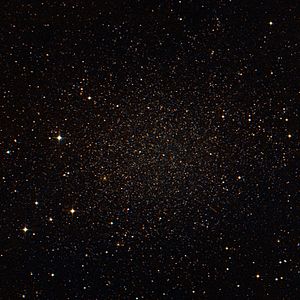Sculptor Dwarf Galaxy
| Sculptor Dwarf Elliptical Galaxy | |
|---|---|
 |
|
| Observation data (J2000 epoch) | |
| Constellation | Sculptor |
| Right ascension | 01h 00m 09.3s |
| Declination | −33° 42′ 33″ |
| Redshift | 110 ± 1 km/s |
| Distance | 290 ± 30 kly (90 ± 10 kpc) |
| Apparent magnitude (V) | 10.1 |
| Characteristics | |
| Type | E |
| Apparent size (V) | 39′.8 × 30′.9 |
| Other designations | |
| Sculptor Dwarf Spheroidal,PGC 3589, MCG-06-03-015 | |
The Sculptor Dwarf Galaxy (also known as Sculptor Dwarf Elliptical Galaxy or the Sculptor Dwarf Spheroidal Galaxy) is a dwarf spheroidal galaxy that is a satellite of the Milky Way. The galaxy lies within the constellation Sculptor. It was discovered in 1937 by American astronomer Harlow Shapley using the 24-inch Bruce refractor at Boyden Observatory. The galaxy is located about 290,000 light-years away from the Solar System. The Sculptor Dwarf contains only 4 percent of the carbon and other heavy elements in our own galaxy, the Milky Way, making it similar to primitive galaxies seen at the edge of the universe.
The metallicity of Sculptor dwarf appears to be broken up into two distinct groups, one with [Fe/H] = -2.3 and the other with [Fe/H] = -1.5. Similar to many of the other Local Group galaxies, the older metal-poor segment appears more extended than the younger metal-rich segment.
Sculptor Dwarf Galaxy taken by the 2.2-meter MPG/ESO telescope.
Coordinates: ![]() 01h 00m 09.3s, −33° 42′ 33″
01h 00m 09.3s, −33° 42′ 33″
...
Wikipedia
